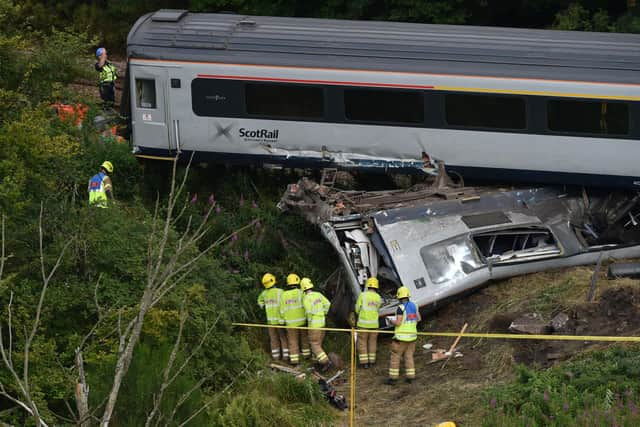Network Rail in the dock over Stonehaven crash - Bruce Craig
The fatal incident, which took place on 12 August 2020, followed heavy rainfall and subsequent landslides that led to a train derailment at Carmont, near Stonehaven, Aberdeenshire.
The train, operated by ScotRail, was en route from Aberdeen to Glasgow when it hit a landslide on a section of track that had been compromised by the severe weather. The driver, conductor and one passenger lost their lives, while six others were injured.
Advertisement
Hide AdAdvertisement
Hide AdThe incident prompted an investigation by the Rail Accident Investigation Branch (RAIB) to determine the sequence of events that led to the crash. The RAIB’s final report, published in February 2022, made a series of recommendations, including better management of the risks associated with older trains and improved response to extreme rainfall.


Network Rail is now due to face criminal proceedings at the High Court in Aberdeen on 7 September. According to the High Court roll, published by the Scottish Courts and Tribunal Service, the case will involve a “section 76 indictment” – a signal that Network Rail may have told prosecutors it intends to plead guilty.
Whilst the exact nature of the charges remains unclear, the likelihood is they will involve alleged breach or breaches of the 1974 Health and Safety at Work etc Act. That Act requires an employer to ensure the health and safety of its workers and others affected by its work, insofar as reasonably practicable. Failure can result in a substantial fine.
Network Rail has issued a statement expressing its condolences to the victims’ families and acknowledging the tragic nature of the event. The company has also committed to cooperating fully with the legal proceedings while maintaining its dedication to improving safety protocols across the UK rail network.
The legal proceedings could also shine a spotlight on broader issues of railway safety, climate resilience, and the responsibilities of infrastructure companies in the face of changing environmental conditions.


A spokesperson for Network Rail said the organisation could not comment on the ongoing legal proceedings, but said it accepted that the RAIB report into the incident “made clear that there were fundamental lessons to be learnt”.
They added: “The Carmont derailment and the tragic loss of Christopher Stuchbury, Donald Dinnie and Brett McCullough was a terrible day for our railway and our thoughts remain with their families and all those affected by the accident. Since August 2020, we have been working hard to make our railway safer for our passengers and colleagues.”
The development comes just weeks after Transport for London, which owns and maintains London’s transport infrastructure, received a record fine after pleading guilty to a series of offences under the 1974 Act.
Advertisement
Hide AdAdvertisement
Hide AdSeven people died and dozens were injured – 19 seriously – when a tram, travelling in poor weather and at three times the permitted speed, overturned approaching Sandilands junction in Croydon in November 2016. Alongside Transport for London’s £10 million penalty, Tram Operations Limited, the network operator, was fined £4 million.
Bruce Craig, Partner and regulatory expert at Pinsent Masons
Comments
Want to join the conversation? Please or to comment on this article.